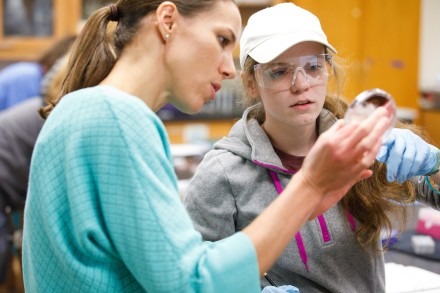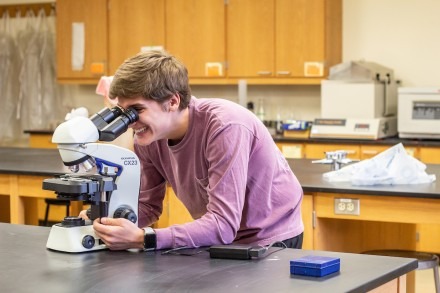Rockhurst University offer four different tracks in the Bachelor of Science in biology degree, as well as a biology minor.


Learning Outcomes
- Describe unifying tenets and concepts of biology.
- Execute scientific methodology to generate, analyze and interpret quantifiable data.
- Articulate scientific information, both orally and in writing.
- Employ basic techniques and equipment used in biological investigation.
- Work and communicate effectively as part of a team in any scientific setting.
Program Outcomes
What is biology?
In general, biology is the study of living organisms. Earning a biology degree is a gateway to so many biology careers, from medicine to research to conservation.
Our bachelor's in biology degree offers world-class academics paired with a solid career outlook and allows you to further specialize your biology training by focusing on one track. Interested in other biology major-related careers? We provide opportunities to supplement your knowledge beyond these four tracks with an understanding of microbiology and human biology.
Rockhurst biology degree offerings give you a solid foundation to build upon as you look forward to a successful career in science.
What can you do with a biology degree?
With a well-rounded education in biology, all Rockhurst University biology tracks prepare undergraduates for entry into graduate schools, health-related fields (medical, nursing, dentistry, veterinary) and the job market, including careers in scientific research, conservation, environmental law and policy, biotechnology, forensics, agriculture, education, science policy, non-profits, and local, state and federal agencies. The availability of various tracks allows students to tailor a degree program to their specific interests.
Researcher
Medical Writer
Agricultural Technician
Science Teacher
Health Communications
Health Educator
Physician Assistant
Geneticist
Course Map
Degree and class descriptions and requirements can be found by clicking on the course catalog listings below:
Popular Courses
This general biology course focuses on ecological and evolutionary concepts. Fungi, plants, and animals will be compared with respect to their phylogeny, reproductive cycles, nutrition, nutrient transport, and response to environmental stimuli.
A course in the proper approach to research including library utilization, computer “search techniques” and experiential design. Each student is taught to complete the steps necessary to implement a scientific research program.
A study of the structure, chemical and molecular, and function of the cell. While the eukaryotic cell and its components are the primary consideration, prokaryotic cells are studied and compared with their evolved descendants.
An opportunity for students of any major to broaden their understanding of global ecosystems through field study. A two-week intensive field experience that is prefaced by a semester-long, weekly seminar discussing the uniqueness and general ecology of each ecosystem/biome to be visited on the trip. Also an anthropological exploration of the history and culture of the region’s people and their relationship with the environment. Past destinations have included Nicaragua, Australia and Fiji.
Degree Info
- National and international field biology major courses
- Undergraduate research experiences with biology faculty in ecology, botany, genetics, parasitology, animal behavior, molecular biology, and microbiology
- Hands on laboratory courses with authentic research experiences
- Tri-Beta, Rockhurst University’s chapter of the national honor society for biology degree students
- Lecture classes capped at 48 students or less
- Opportunities for off-campus research through ongoing partnerships with the University of Kansas Medical Center and Stowers Institute for Medical Research
Find Your Program
Choose topic to quickly find specific program details
